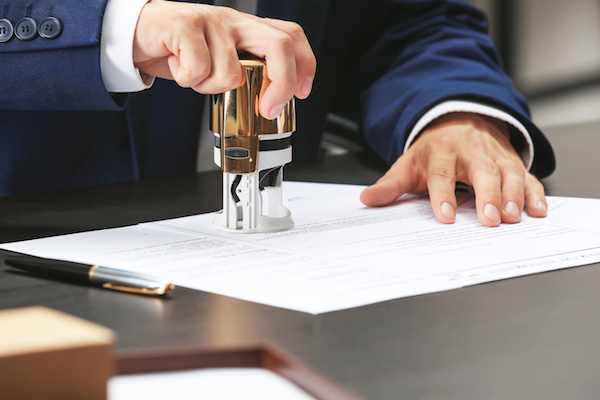It is common knowledge that a document is only legally binding if it is signed by all parties involved. While some documents become valid as soon as all parties have signed on the dotted line, some documents require the presence of a witness and/or notary to confirm that the process was executed correctly. Your NYC attorney should be able to tell you what is required for a legally binding document.
Notaries
It is not always clear which documents necessitate assistance from a notary, so we compiled some frequently asked questions about notaries and witnesses to help you execute your document with confidence.
1. What is a notary?
A notary is a state-appointed official who has been authorized to notarize documents.
2. What do notaries do?
A notary verifies the identity of the parties involved in a contract by checking identification and ensuring the signers understand the document and its contents. This means that signers won’t have to testify in court to verify their signature.
3. How much does a notary cost?
The cost of a notary is completely dependent on the document you need notarized, the notary you choose to work with, and the state where execution will occur.
4. Do I need a notary for my document?
While certain documents do not require notarization, many do. Typically a notary is required when a document includes terms one or more parties must agree to. Here are some documents that require notarization: last will, prenuptial agreement, affidavit, etc.
Witnesses
Witnesses play a very important role in criminal and civil cases. They help clarify what happened by disclosing relevant information about a crime or event. Witnesses must make an oath or solemnly state they will tell the truth in court.
1. What is a witness?
A witness is a neutral third party in whose presence certain legal documents are signed. A witness must be at least 18 years old and of sound mind when witnessing a document’s execution.
2. What does a witness do?
A witness acts as an overseer at the signing of a document. The witness physically observes the signing and ensures that the document was indeed signed by both parties and that forgery did not occur.
3. When do you need a witness?
Not every document requires a witness. The assistance of a witness depends on the document and jurisdiction. Specific legal forms such as a Will do require the presence of one or more witnesses. Other documents that often need a witness are a divorce decree, testament, property deeds, and mortgage agreement.
If you’re unsure if you need a notary or witness for your documents, consult with your NYC attorney Warren S. Dank for additional guidance.

